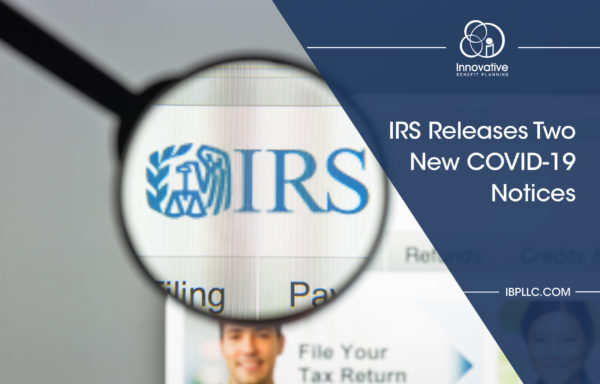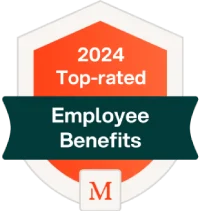IRS Releases Two New COVID-19 Notices

IRS Releases Two New COVID-19 Notices
To provide additional relief to Americans during these challenging times, the IRS released Notice 2020-29 and 2020-33. These notices provided new relaxed rules for 2020 for making elections under Cafeteria plans, using amounts during a grace period or carryover period changes to the method determining the carryover amounts under Health Flexible Spending Accounts (FSAs) and clarifying which premiums can be reimbursed under Individual Coverage Health Reimbursement Arrangements (ICHRAs).
Notice 2020-29
In Notice 2020-29, the IRS provides for increased flexibility with respect to mid-year elections under a cafeteria plan during calendar year 2020 related to employer sponsored health coverage, Health FSAs and Dependent Care Assistance Plans (DCAPs). This notice also provides increased flexibility with respect to grace periods and carryover periods to apply unused amounts in health FSAs to medical care expenses incurred through December 31, 2020, and unused amounts in dependent care assistance programs to dependent care expenses incurred through December 31, 2020.
Specifically, this notice provides that:
- For mid-year elections made during calendar year 2020, a cafeteria plan may permit employees who are eligible to make salary reduction contributions under the plan to:
- with respect to employer-sponsored health coverage,
- make a new election on a prospective basis, if the employee initially declined to elect employer-sponsored health coverage;
- revoke an existing election and make a new election to enroll in different health coverage sponsored by the same employer on a prospective basis; and
- revoke an existing election on a prospective basis, provided that the employee attests in writing that the employee is enrolled, or immediately will enroll, in other health coverage not sponsored by the employer (An example of an acceptable written attestation is provided in the notice);
- revoke an election, make a new election, or decrease or increase an existing election applicable to a Health FSA on a prospective basis; and
- revoke an election, make a new election, or decrease or increase an existing election regarding a DCAP on a prospective basis;
- with respect to employer-sponsored health coverage,
- For unused amounts remaining in a Health FSA or a DCAP under the Cafeteria plan as of the end of a grace period or plan year ending in 2020, a Cafeteria plan may permit employees to apply those unused amounts to pay or reimburse medical care expenses or dependent care expenses, respectively, incurred through December 31, 2020; and
- The relief provided in Notice 2020-15 regarding high deductible health plans (HDHPs) and expenses related to Coronavirus under the CARES Act regarding an exemption for telehealth services, may be applied retroactively to January 1, 2020.
The IRS indicated that these amendments are not required, and an employer has discretion in which rules to adopt. If an employer wishes to adopt them, it must amend its cafeteria plan on or before December 31, 2021.
Notice 2020-33
In Notice 2020-33, the IRS increases the carryover limit (currently $500) of unused amounts remaining as of the end of a plan year in a Health FSA under Cafeteria plan that may be carried over to pay or reimburse a participant for medical care expenses incurred during the following plan year. Specifically, this notice increases the maximum $500 carryover amount for a plan year to an amount equal to 20 percent of the maximum salary reduction contribution under Code Section 125(i) for that plan year. For 2020, this limit is $2750. The carryover limit for 2020 is $550.
Second, this notice clarifies the ability of an ICHRA or Cafeteria plan to reimburse individual insurance policy premium expenses incurred prior to the beginning of the plan year for coverage provided during the plan year. This means that an ICHRA with a calendar year plan year may immediately reimburse a substantiated premium for health insurance coverage that begins on January 1 of that plan year, even if the covered individual paid the premium for the coverage prior to the first day of the plan year.
Categories
Archive








